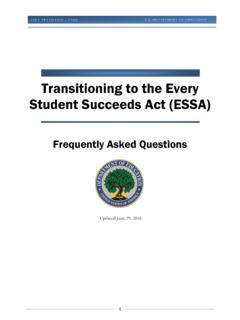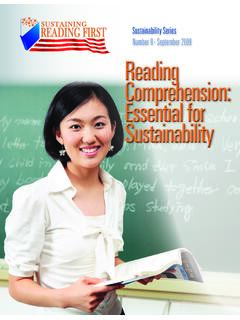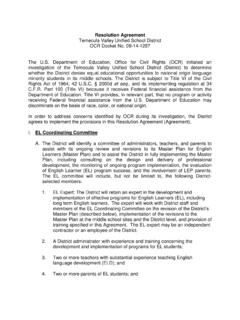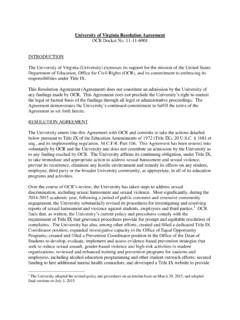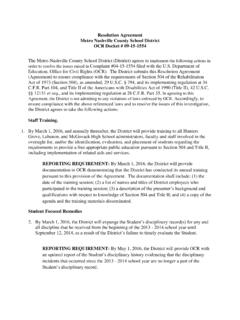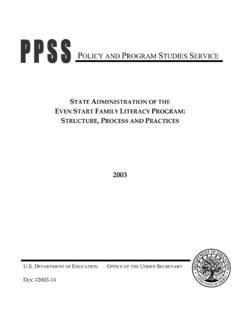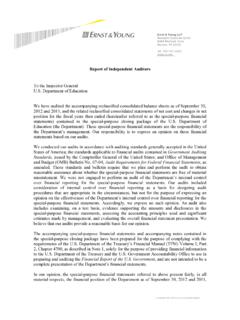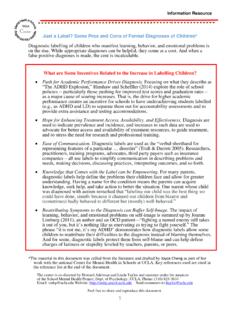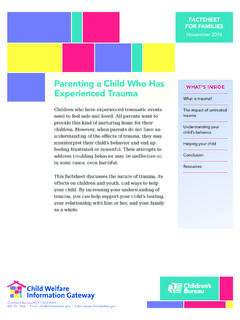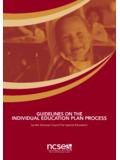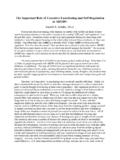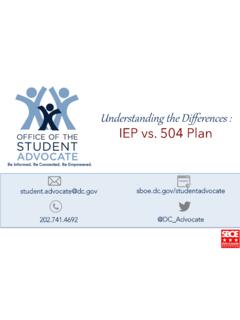Transcription of Dear Colleague Letter and Resource Guide on Students with …
1 Dear Colleague Letter and Resource Guide on Students with adhd Notice of Language AssistanceNotice of Language Assistance:If you have difficulty understanding English, you may, free of charge, request language assistance services for this Department information by calling 1-800-USA-LEARN (1-800-872-5327) (TTY: 1-800-877-8339), or email us at: Aviso a personas con dominio limitado del idioma ingl s:Si usted tiene alguna dificultad en entender el idioma ingl s, puede, sin costo alguno, solicitar asistencia ling stica con respecto a esta informaci n llamando al 1-800-USA-LEARN (1-800-872-5327) (TTY: 1-800-877-8339), o env e un mensaje de correo electr nico a: н 1-800-USA-LEARN 1-800-872-5327 у 1-800-877-8339 28 : ( ) 27 ( ) ( ) 1-800-USA-LEARN (1-800-872-5327) ( 1-800-877-8339) Th ng b o d nh cho nh ng ng i c kh n ng Anh ng h n ch : N u qu v g p kh kh n trong vi c hi u Anh ng th qu v c th y u c u c c d ch v h tr ng n ng cho c c tin t c c a B d nh cho c ng ch ng.
2 C c d ch v h tr ng n ng n y u mi n ph . N u qu v mu n bi t th m chi ti t v c c d ch v phi n d ch hay th ng d ch, xin vui l ng g i s 1-800-USA-LEARN (1-800-872-5327) (TTY: 1-800-877-8339), ho c email: : , .. , 1-800-USA-LEARN (1-800-872-5327) 1-800-877-8339 3 .Paunawa sa mga Taong Limitado ang Kaalaman sa English:Kung nahihirapan kayong makaintindi ng English, maaari kayong humingi ng tulong ukol dito sa inpormasyon ng Kagawaran mula sa nagbibigay ng serbisyo na pagtulong kaugnay ng wika. Ang serbisyo na pagtulong kaugnay ng wika ay libre. Kung kailangan ninyo ng dagdag na impormasyon tungkol sa mga serbisyo kaugnay ng pagpapaliwanag o pagsasalin, mangyari lamang tumawag sa 1-800-USA-LEARN (1-800-872-5327) (TTY: 1-800-877-8339), o mag-email sa: для лиц с ограниченным знанием английского языка: Если вы испытываете трудности в понимании английского языка, вы можете попросить, чтобы вам предоставили перевод информации, которую Министерство Образования доводит до всеобщего сведения.
3 Этот перевод предоставляется бесплатно. Если вы хотите получить более подробную информацию об услугах устного и письменного перевода, звоните по телефону 1-800-USA-LEARN (1-800-872-5327) (служба для слабослышащих: 1-800-877-8339), или отправьте сообщение по адресу: Colleague : I write this Letter to clarify and provide guidance on the Federal obligations of school districts that receive Federal financial assistance from the Department of Education (the Department) to Students with attention-deficit/hyperactivity disorder ( adhd )1 under Section 504 of the Rehabilitation Act of 1973 (Section 504) and the Department s implementing This Federal law prohibits discrimination on the basis of disability and requires school districts to provide an equal educational opportunity to Students with disabilities. Because the Americans with Disabilities Act Amendments Act (Amendments Act) clarified the broad scope and definition of the term disability, more Students with adhd are now clearly 1 adhd is used throughout this Letter to refer to Students having either attention deficit disorder (ADD) or adhd .
4 2 29 794; 34 Part 104. While this Letter touches on the Individuals with Disabilities Education Act (IDEA), the Federal law through which the majority of children with adhd receive special education and related services, the focus is on the requirements of Section 504, as set out in the Department s Section 504 implementing regulations at 34 Part 104. OCR does not administer the IDEA. The Office of Special Education Programs (OSEP) in the Department s Office of Special Education and Rehabilitative Services (OSERS) administers the IDEA. All Students with disabilities who are eligible for special education and related services under the IDEA, however, are also protected by Section 504. Consequently, OCR enforces the Section 504 rights of Students who are also covered by the IDEA. For general information about the IDEA, please see This Letter does not address the rights of Students with disabilities under the Workforce Innovation and Opportunity Act (WIOA), Pub.
5 L. No. 113-128, 128 Stat. 1425 (2014). For general information about the rights of Students with disabilities under WIOA, please see and . Notice of Significant Guidance. The Department of Education (Department) has determined that this Letter and the accompanying Resource Guide are significant guidance under the Office of Management and Budget s Final Bulletin for Agency Good Guidance Practices, 72 Fed. Reg. 3432 (Jan. 25, 2007). Significant guidance is non-binding and does not create or impose new legal requirements. The Department is issuing this Letter and Guide to provide State and local educational agencies, including charter schools, with information to assist them in meeting their obligations under Federal civil rights laws, including Section 504 of the Rehabilitation Act of 1973, and implementing regulations that it enforces. 29 794; 34 Part 104. This Letter also provides members of the public with information about their rights under the lawand you are interested in commenting on this Letter or Guide , or have questions, please send them to OCR by email at by phone at 800-421-3481 (TDD 800-877-8339), or by mail to the Office for Civil Rights, Department of Education, 400 Maryland Avenue SW, Washington, DC 20202.
6 For further information about the Department s guidance processes, please visit UNITED STATES DEPARTMENT OF EDUCATION OFFICE FOR CIVIL RIGHTS THE ASSISTANT SECRETARYJuly 26, 2016 [OCR-00096]Page 2 Dear Colleague Letter and Resource Guide on Students with adhd entitled to the protections under Section Over the past five fiscal years (2011-2015), the Department s Office for Civil Rights (OCR) has received more than 16,000 complaints alleging discrimination on the basis of disability in elementary and secondary education programs. Approximately 2,000, or one in nine, of these complaints involved allegations of discrimination against a student with adhd . In resolving such complaints, OCR has found that many teachers and administrators often take appropriate action to ensure that Students with adhd receive the protections to which they are entitled under Federal law, but many others are not familiar with this disorder, or how it could impact a student s equal access to a school district s program.
7 Through our enforcement efforts, we have learned that many Students with adhd are still experiencing academic and behavioral challenges in the educational setting, and that policy guidance is needed to ensure that those Students are receiving a free appropriate public education (FAPE) as defined in the Department s regulations implementing Section 504. OCR investigations have revealed that Students with adhd could be denied FAPE because of problems that school districts have in identifying and evaluating Students who need special education or related services because of adhd . Some of these problems are as follows: Students never being referred for, or identified by the school district as needing, an evaluation to determine whether the student has a disability and needs special education or related services; Students not being evaluated in a timely manner once identified as needing an evaluation; or school districts conducting inadequate evaluations of Students .
8 In addition, even if properly identified, a student with adhd who is determined to have a disability may not always receive required services. OCR, through its enforcement efforts, has observed that school districts fail to meet their Section 504 obligations when they: make inappropriate decisions about the regular or special education, related aids and services, or supplementary aids and services the student needs, and the appropriate setting in which to receive those services based on a misunderstanding of adhd and the requirements of Section 504; 3 OCR, Dear Colleague Letter (Jan. 19, 2012), See also OCR, Questions and Answers on the ADA Amendments Act of 2008 for Students with Disabilities Attending Public Elementary and Secondary Schools (Jan. 19, 2012), Further discussion on the interplay between Section 504 and the Americans with Disabilities Act can be found in the accompanying Resource Guide in the section Federal Disability Laws.
9 Page 3 Dear Colleague Letter and Resource Guide on Students with adhd fail to distribute relevant documentation to appropriate staff; or consider inappropriate administrative and financial burdens in selecting and providing appropriate related aids and services. The failure to provide needed services to Students with disabilities can result in serious social, emotional, and educational harm to the Students involved. It can also unnecessarily drain school district and family resources if the school is ineffectually attempting to meet the needs of Students with disabilities through failed interventions or disciplinary consequences. As outlined in the Department s regulations implementing Section 504, school districts must conduct individualized evaluations of Students who, because of disability, including adhd , need or are believed to need special education or related services, and must ensure that qualified Students with disabilities receive appropriate services that are based on specific needs, not cost, and not based on stereotypes or generalized misunderstanding of a These and other Section 504 obligations apply to all Students with disabilities and are discussed in this guidance as they specifically pertain to Students with Through this Letter and the accompanying Resource Guide , OCR seeks to help educators, families, Students .
10 And other stakeholders better understand these laws as they pertain to Students with adhd in elementary and secondary schools in order to ensure that these Students receive the regular or special education, related aids and services, or supplementary aids and services the student needs to be successful. I encourage you to use this information to ensure that your school district is properly evaluating and providing timely and appropriate services to Students with Sincerely, /s/ Catherine E. Lhamon Assistant Secretary for Civil Rights 4 34 (l)(2), , 5 For further, generally applicable information about the rights of Students with disabilities, due to any impairment, please see Protecting Students With Disabilities Frequently Asked Questions About Section 504 and the Education of Children with Disabilities, (Oct. 16, 2015), OCR also anticipates providing additional information for parents explaining these rights.



